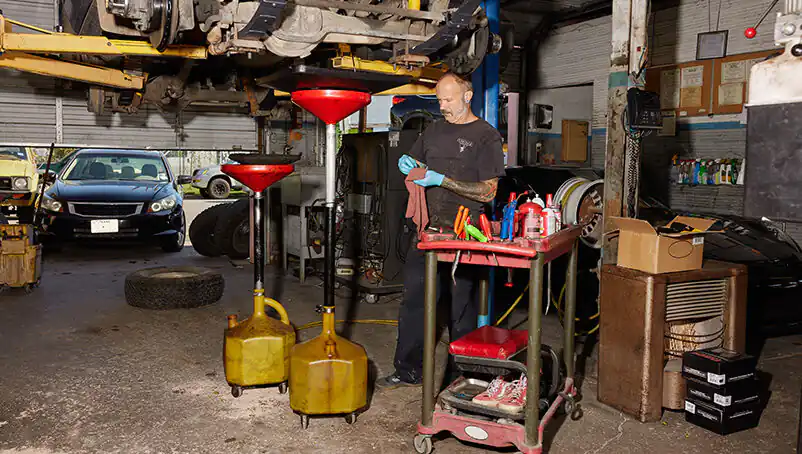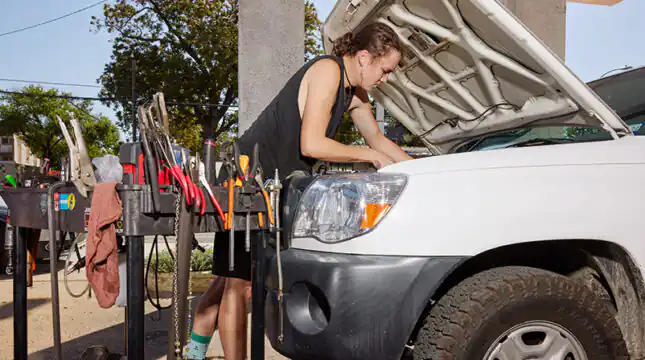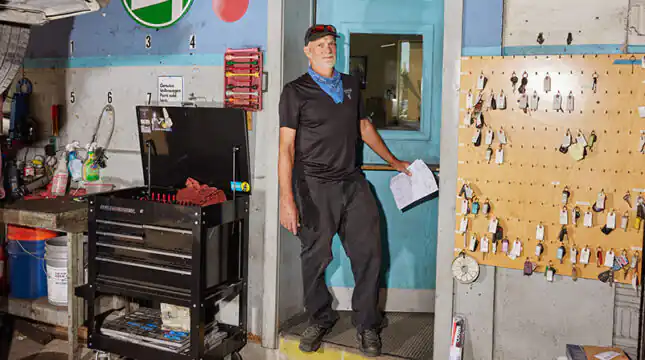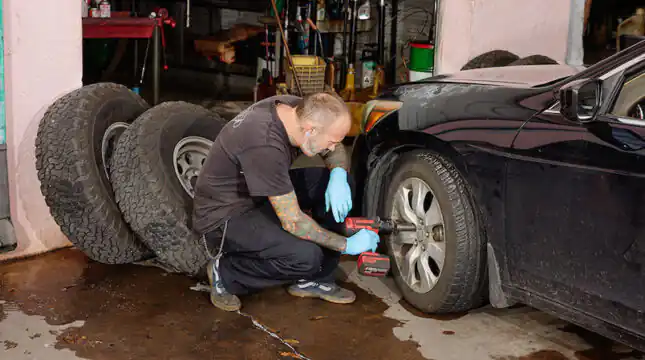New York
License required: No, but you must register your business
In New York, auto mechanics do not need to hold a professional license. However, you must register your business with the Department of Motor Vehicles (DMV)
The state requires annual vehicle safety inspections, which a certified motor vehicle inspector must perform. To earn this certification from the DMV, you must have one of the following:
- At least one year of experience repairing motor vehicles in the last five years through employment in the industry or an approved work study program
- A high school or vocational school diploma in automotive trades or a certification of completion of the first year of college courses toward an associate’s degree in automotive technology
Before obtaining certification, you must complete an inspector training program and pass a written test. Your certificate must be renewed every three years.
Required business insurance in New York:
- New York requires workers’ compensation if you have any employees.
- If you drive for work-related tasks, you may need commercial auto coverage. New York’s minimum motor vehicle requirements are $25,000 per person / $50,000 per accident / $10,000 property damage.
North Carolina
License required: No
General auto mechanics do not need a license in North Carolina.
Motor vehicles in this state must pass an annual safety inspection. In some counties, vehicles must pass an emissions test as well. In order to perform these inspections, mechanics must have a license issued by the Department of Motor Vehicles.
Before submitting your license application, you must complete an approved eight-hour course. Many community colleges throughout the state offer these courses, such as South Piedmont Community College and Wake Technical Community College. You must renew your license every two years.
Required business insurance in North Carolina:
- North Carolina requires workers’ compensation if you have three or more employees.
- If you drive for work-related tasks, you may need commercial auto coverage. North Carolina’s minimum motor vehicle requirements are $30,000 per person / $60,000 per accident / $25,000 property damage.
North Dakota
License required: No
In North Dakota, auto mechanics do not need to have a license to work.
However, many repair shop owners prefer to hire mechanics who have completed a formal training program and earned one or more ASE certifications. You can find certificate and degree programs at many educational institutions throughout the state, including Bismarck State College, Lake Region State College and United Tribes Technical College.
Required business insurance in North Dakota:
- North Dakota requires workers’ compensation if you have any employees, and it must be purchased through the state fund.
- If you drive for work-related tasks, you may need commercial auto coverage. North Dakota’s minimum motor vehicle requirements are $25,000 per person / $50,000 per accident / $25,000 property damage.
Ohio
License required: No
Ohio does not require professional licenses for auto mechanics.
The state runs an emissions testing program called E-Check in seven counties in the Cleveland and Akron areas. Each emissions repair facility must employ at least one E-Check certified repair technician. To earn this credential, you must complete an approved training program and be ASE-certified in the following areas:
- A6: Electrical/electronic systems
- A8: Engine performance
Required business insurance in Ohio:
- Ohio requires workers’ compensation if you have any employees, purchased through a state agency.
- If you drive for work-related tasks, you may need commercial auto coverage. Ohio’s minimum motor vehicle requirements are $25,000 per person / $50,000 per accident / $25,000 property damage.
Oklahoma
License required: No
In Oklahoma, you do not have to obtain a professional license to work as an auto mechanic.
In this industry, you may discover that completing an educational program and holding ASE certifications improves your job prospects. You can find training in this field through degree and certificate programs at schools like Oklahoma City Community College, High Plains Technology Center, Tulsa Tech and Kiamichi Tech.
Required business insurance in Oklahoma:
- Oklahoma requires workers’ compensation if you have five or more employees.
- If you drive for work-related tasks, you may need commercial auto coverage. Oklahoma’s minimum motor vehicle requirements are $25,000 per person / $50,000 per accident / $25,000 property damage.
Oregon
License required: No
In Oregon, you do not need to fulfill a mechanic licensing requirement to work in this state.
In many cases, completing an automotive technology program at an accredited educational institution or obtaining ASE certifications will make you a more attractive candidate to potential employers.
Training programs for mechanics can be found at several Oregon schools, including Mt. Hood Community College, Portland Community College, Chemeketa Community College and Central Oregon Community College.
Required business insurance in Oregon:
- Oregon requires workers’ compensation if you have any employees.
- If you drive for work-related tasks, you may need commercial auto coverage. Oregon’s minimum motor vehicle requirements are $25,000 per person / $50,000 per accident / $20,000 property damage.
Pennsylvania
License required: No
In Pennsylvania, auto mechanics do not need to have a professional license.
Certification requirements apply if you want to complete vehicle safety and emissions inspections, which the state requires annually for most cars and trucks. To become a certified safety inspector or emissions inspector, you must complete a certification course at a school approved by the Pennsylvania Department of Transportation.
Certification requirements also apply when making emissions-related repairs. To become a certified emissions repair technician, you must provide proof of advanced automotive diagnosis and repair training or ASE certification in one of the following areas:
- A8: Engine performance
- L1: Advanced engine performance
- T1: Gasoline engines
Required business insurance in Pennsylvania:
- Pennsylvania requires workers’ compensation if you have any employees.
- If you drive for work-related tasks, you may need commercial auto coverage. Pennsylvania’s minimum motor vehicle requirements are $15,000 per person / $30,000 per accident / $5,000 property damage.
Rhode Island
License required: No, but you must be certified
Auto mechanics in Rhode Island must maintain technician certifications to perform the following types of service and repair work:
- Identification and analysis of damage to vehicles
- Frame measuring and straightening systems and techniques
- Welding in collision repair
- Structural steel repairs
- Suspension, steering and alignment systems
- Safety restraint systems
- Corrosion protection
To obtain technician certification in one or more categories, you must provide proof that you have completed a corresponding course or test approved by the state. Options include certification through ASE, I-Car or P&L Consultants.
Additionally, any mechanic who completes emissions-related work in Rhode Island must become a Certified Inspection Technician (CIT) or Certified Inspection Repair Technician (CIRT). To become a CIT, you must complete a training program and a four-hour emissions course and then pass an exam.
To become a CIRT, you must provide proof of ASE L1 certification. If you do not have L1 certification, you may pass a state CIRT exam, which allows you two additional years to pass the L1 test.
Required business insurance in Rhode Island:
- RI requires workers’ compensation if you have one or more employees.
- If you drive for work-related tasks, you may need commercial auto coverage. Rhode Island’s minimum motor vehicle requirements are $25,000 per person / $50,000 per accident / $25,000 property damage.
South Carolina
License required: No
South Carolina auto mechanics don’t need a professional license from the state.
If you wish to improve your job prospects in the industry, however, consider pursuing ASE certification or completing an automotive technology training program. You can find programs specifically designed to prepare students to take ASE certification exams at schools like Midlands Technical College, York Technical College and Orangeburg-Calhoun Technical College.
Required business insurance in South Carolina:
- South Carolina requires workers’ compensation if you have four or more employees.
- If you drive for work-related tasks, you may need commercial auto coverage. South Carolina’s minimum motor vehicle requirements are $25,000 per person / $50,000 per accident / $25,000 property damage.










